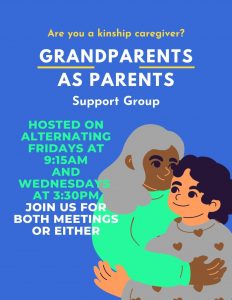
An increasing number of grandparents and other relatives find themselves serving as parents for children whose own parents are unable to care for them. Sometimes, the arrangement (referred to as “kinship care”) is an informal, private arrangement between the parents and relative caregivers; in other situations, the child welfare system is involved. These courageous, caring individuals have stepped in when parents have been unable to raise their children for reasons such as addiction, incarceration, military duty, or physical or mental illness.
The Connecticut Department of Children and Families (DCF) recently reported the percentage of children in care living with kin increased from 21 percent in January 2011 to 29.8 percent in July 2013, representing an increase of 41.8 percent.
According to the Child Welfare League of America publication, Connecticut’s Children 2016:
- In 2014, approximately 19,702 grandparents in Connecticut had primary responsibility caring for their grandchildren.
- 995 of the children in out-of-home care in 2013 were living with relatives while in care.
While most of these grandparents and other relative caregivers will say they gain great joy from their role, they also face financial, health, housing, education and work challenges that often foil their retirement plans, not to mention the complexities inherent in navigating new family relationships and roles. If this sounds like you, you are not alone! There are resources available to support you.
Learn More
Kinship Caregiver Support Groups
Featured Reading
Raising Your Children’s Children: Help for Grandparents Raising Grandkids
 Martha Sparks, 2011
Martha Sparks, 2011
Over six million children live in grandparent-headed households in the United States today. The number continues to rise. More than 80 percent of these cases occur because of drug or alcohol addiction. Grandparents raising grandchildren occurs in all ethnic and socio-economic groups.
But where do you start? There are court proceedings, lawyer bills, and sometimes hospital bills, not to mention emotional needs of the children and grandparents alike. This book will provide answers to sudden questions from the world of child neglect and abuse, court proceedings, custody arrangements, and drug addiction grandparents never knew existed.
AAP Lending Library
View books and DVDs on Relative Guardians available to borrow
Online Learning
Kinship Care
Online course offered by Foster Parent College
Joseph Crumbley, D.S.W., explores issues specific to kinship care. The course focuses on some of the unique problems and stressors related to this type of care. Dr. Crumbley offers caregivers insights and steps on kinship parenting, and he provides general steps for parents to consider when parenting these special foster children.
Articles and Websites
Taking Care of Yourself While Raising Your Grandchildren Retire Guide, February 2021
AARP
Offers a GrandFamilies Guide and GrandFamilies Resources for grandparents and other relatives raising grandchildren.
The Brookdale Foundation
The Foundation initiated the Relatives as Parents Program (RAPP) in 1996 to encourage and promote the creation or expansion of services for grandparents and other relatives who have taken on the responsibility of surrogate parenting due to the absence of the parents.
Connecticut Adoption Community Network (ACN)
Provides a list of support groups in Connecticut for grandparents and other relatives raising children.
Connecticut 211 Kinship Navigator
Provides a database of kinship care family resources and services.
Grandparents as Parents Support Network (GAPS)
Developed by Connecticut Department of Social Services’ Aging Services Division, this site provides assistance in establishing support groups for grandparents and relatives raising children. A list of active groups is provided as well as other helpful links.
Kinship Caregivers and the Child Welfare System
Child Welfare Information Gateway, May 2016
Notice to Guardians: Kinship and Family Respite Grants
As a court-appointed guardian, you may be eligible to receive money from the Kinship Fund and Family Respite Fund Programs. These programs are administered by the Children’s Trust Fund through the Probate Courts.
Paths to Permanence: Kin Guardianship and Adoption
Adoption Advocate No. 59, National Council for Adoption, March 2013
Working with Kinship Caregivers
Child Welfare Information Gateway, February 2012
Please note: The Adoption Assistance Program (AAP) does not promote or endorse any websites, organizations or individuals that may be linked from this site. The AAP does not guarantee the accuracy of the information or the appropriateness of advice for a particular situation. It is our intent to assist users in their search for reliable and useful sources of information pertaining to adoption, legal guardianship, and parenting.
